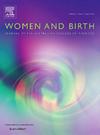"蝴蝶在空中飞舞,你现在是母乳喂养的母亲了":妇女产后接受助产士母乳喂养支持的定性研究。
IF 4.4
2区 医学
Q1 NURSING
引用次数: 0
摘要
背景:尽管母乳喂养被广泛接受为婴儿的最佳喂养方法,但许多妇女没有达到母乳喂养目标或继续母乳喂养推荐的时间。继续纯母乳喂养是多方面的,产后助产支助被认为是一个重要组成部分。然而,人们对妇女如何在不同的护理模式下从助产士那里获得这种支持知之甚少。目的:探讨在助产护理模式的背景下,妇女接受助产教育和产后婴儿喂养支持的经验。方法:采用解释性描述方法对14名产后妇女进行半结构化访谈。通过反思性专题分析来分析数据,以确定主题。研究结果:确定了两个主题,每个主题有三个副主题:(1)如何提供助产母乳喂养支持;(2)母乳喂养的期望和现实。讨论:助产士的母乳喂养支持和教育经验通常被报道为肤浅的,有时是简单的。助产士提供了母乳喂养指导,重点是母乳喂奶的技术方面,这允许在进行其他任务之前进行短暂的护理。妇女们对母乳喂养婴儿的现实感到惊讶,并理解母乳喂养不仅仅是提供营养。结论:助产教育和母乳喂养支持应优先作为护理的重要组成部分,并根据妇女的需求个性化。具体来说,重要的是提供教育,而不仅仅是关注母乳喂养的健康益处,这可能使助产士能够促进其他方面,例如积极的情感和联系体验。本文章由计算机程序翻译,如有差异,请以英文原文为准。
“Butterflies in the air, you’re now a breastfeeding mother”: A qualitative study of women’s experiences receiving postnatal midwifery breastfeeding support
Background
Despite breastfeeding being widely accepted as the optimal feeding method for infants many women do not meet their breastfeeding goals or continue to breastfeed as long as recommended. Continuation of exclusive breastfeeding is multifactorial, with midwifery support during the postnatal period considered to be an important component. However, little is known about how women receive this support from midwives across varying models of care.
Aim
To explore women’s experiences of midwifery education and support with postnatal infant feeding in the context of midwifery models of care.
Methods
Semi-structured interviews were conducted with 14 postnatal women, using an interpretive descriptive approach. Data were analysed through reflective thematic analysis to identify themes.
Findings
Two themes each with three subthemes were identified: (1) How midwifery breastfeeding support was provided, and (2) Expectations and realities of breastfeeding.
Discussion
Experiences of breastfeeding support and education by midwives were often reported as being superficial and at times, simplistic. Midwives offered breastfeeding guidance that focused on technical aspects of latching, which allowed for brief episodes of care before moving onto other tasks. Women described surprise at the realities of breastfeeding a baby, and the understanding that it involves more than simply providing nutrition.
Conclusion
Midwifery education and support of breastfeeding should be prioritised as an important component of care, and personalised to the woman’s requirements. Specifically, it is important to provide education beyond a focus on the health benefits of breastfeeding, which may allow midwives to promote other aspects, such as positive emotional and bonding experiences.
求助全文
通过发布文献求助,成功后即可免费获取论文全文。
去求助
来源期刊

Women and Birth
NURSING-OBSTETRICS & GYNECOLOGY
CiteScore
7.20
自引率
13.20%
发文量
371
审稿时长
27 days
期刊介绍:
Women and Birth is the official journal of the Australian College of Midwives (ACM). It is a midwifery journal that publishes on all matters that affect women and birth, from pre-conceptual counselling, through pregnancy, birth, and the first six weeks postnatal. All papers accepted will draw from and contribute to the relevant contemporary research, policy and/or theoretical literature. We seek research papers, quality assurances papers (with ethical approval) discussion papers, clinical practice papers, case studies and original literature reviews.
Our women-centred focus is inclusive of the family, fetus and newborn, both well and sick, and covers both healthy and complex pregnancies and births. The journal seeks papers that take a woman-centred focus on maternity services, epidemiology, primary health care, reproductive psycho/physiology, midwifery practice, theory, research, education, management and leadership. We also seek relevant papers on maternal mental health and neonatal well-being, natural and complementary therapies, local, national and international policy, management, politics, economics and societal and cultural issues as they affect childbearing women and their families. Topics may include, where appropriate, neonatal care, child and family health, women’s health, related to pregnancy, birth and the postpartum, including lactation. Interprofessional papers relevant to midwifery are welcome. Articles are double blind peer-reviewed, primarily by experts in the field of the submitted work.
 求助内容:
求助内容: 应助结果提醒方式:
应助结果提醒方式:


